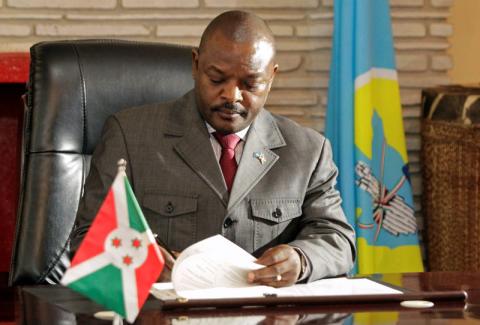Advertisement
Burundi threatens to quit UN Human Rights Council, sue critics
GENEVA (Reuters) - Burundi, beset by accusations of crimes sagainst humanity, threatened on Monday to withdraw from the U.N. Human Rights Council and sue its critics.
A U.N. Commission of Inquiry, set up in 2016, published a detailed 272-page report that said the government and its supporters were responsible for crimes against humanity.
The Central African state has refused to cooperate with the three commissioners and last week declared them to be personae non gratae.
Burundian Ambassador Renovat Tabu told the Council that the report was "full of lies" and "politically motivated" and said it had "no regard for states, peoples and leaders".
“We must... have a culture of truth rather than letting ourselves be poisoned, indoctrinated, and intoxicated by the culture of lies which only destroys the morality of the world,” Tabu said.
“Burundi reserves the possibility of bringing to justice any person who engages in defamation, even a member of the Commission.”
The three commissioners rejected Burundi's complaints, saying they were immune from legal action over any alleged defamation and Burundi's withdrawal from the Council would achieve little, without shielding it from scrutiny.
On Friday, Willy Nyamitwe, an adviser to President Pierre Nkurunziza, said Burundi's human rights and justice ministers were in Geneva to meet U.N. human rights chief Michelle Bachelet.
If Burundi was not treated better, it reserved the right to pull out of the U.N. Human Rights Council, Nyamitwe said.
The three commissioners welcomed the meeting between Bachelet and the Burundian ministers, hoping it could be a sign of a new willingness by Bujumbura to cooperate with the United Nations.
Nyamitwe blamed the accusations in the report on Belgium, the former colonial power in Burundi, and the European Union, which he said wanted to destabilise the country. He also accused neighbouring Rwanda of arming and recruiting Burundian refugees to try to overthrow the government in 2015.
He said the report had ignored serious crimes committed by 34 people wanted in Burundi for involvement in the 2015 insurrection. Some were now activists based in Europe.
“I have seen some of them here (at the Human Rights Council)," Nyamitwe said. "We have seen them walking around the (U.N.) Palais des Nations."
Nyamitwe also defended Burundi's decision to eject three U.N. experts who were supposed to be helping the government with human rights. Nyamitwe said they had arrived in the country without announcing their role.
“That was like an act of war, as if they were spies,” he told reporters.
(Reporting by Tom Miles; Editing by Mark Heinrich)



















Add new comment